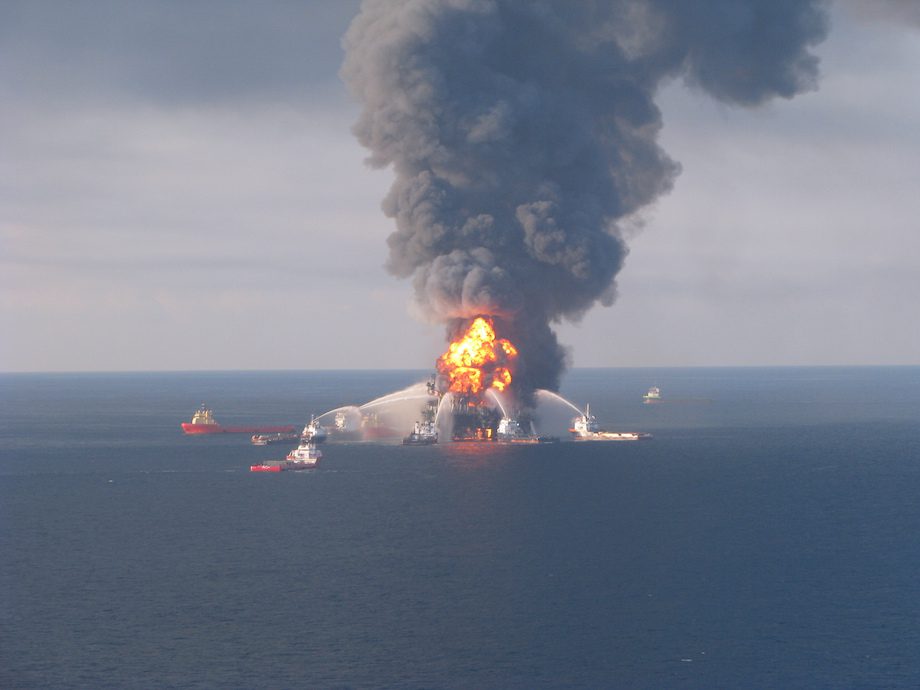Deepwater Horizon burns in the Gulf of Mexico, April 21, 2010. Photo: U.S. Coast Guard
 By Valerie Volcovici WASHINGTON, May 2 (Reuters) – The Trump administration unveiled on Thursday its final plan to roll back offshore drilling safety measures put in place by the Obama administration after the fatal 2010 BP Deepwater Horizon oil spill, the worst in U.S. history, raising concerns by some groups over potential risks to workers and the environment.
By Valerie Volcovici WASHINGTON, May 2 (Reuters) – The Trump administration unveiled on Thursday its final plan to roll back offshore drilling safety measures put in place by the Obama administration after the fatal 2010 BP Deepwater Horizon oil spill, the worst in U.S. history, raising concerns by some groups over potential risks to workers and the environment.
The changes are projected to save oil and gas drillers at least $1 billion over 10 years, according to an Interior Department spokeswoman.
The Interior Department announced the final revised rule at an event in Port Fourchon, a Louisiana seaport that services over 90% of the Gulf of Mexico’s deepwater oil production.
Last year, the agency’s Bureau of Safety and Environmental Enforcement proposed revisions to the 2016 offshore well control rule, which had required real-time monitoring of operations and certification by third parties of emergency devices, among other measures.
Scott Angelle, head of BSEE, said in an op-ed in Louisiana’s The Advocate newspaper on Thursday the agency had revised 68 of 342 provisions of the Obama administration’s well control rule, and put forward a “safer, smarter improved rule.”
“The rule unveiled today employs a performance-based approach to meet real-time monitoring requirements, removes duplicative certification requirements that add no value, reduces blowout preventer failure risks, and improves the expected lifespan of critical blowout preventer components,” he wrote.
The revised rule reflects changes sought by the oil and gas industry that said the Obama-era rules imposed financial burdens that would curtail future development and production.
Environmental groups warned that relaxing the well control rule was reckless and another example of the Trump administration catering to industry demands.
“The Trump administration is putting industry cost savings ahead of safety just weeks after the anniversary of the worst oil spill in U.S. history,” said Diane Hoskins, campaign director for ocean conservation group, Oceana.
“We should be implementing new safety reforms, not rolling back the too-few safety measures currently in place.”
The BP Macondo well blowout and fire on the Deepwater Horizon drilling rig on April 20, 2010 killed 11 workers and cost billions of dollars for Gulf Coast restoration.
The Obama administration had created a task force to examine the causes of the accident, and those findings were key in the formulation of the Obama-era rules.
Democratic Senator Tom Carper, the top Democrat on the Senate environment committee, said the new rule flouts the findings of that task force.
“It blatantly ignores the lessons learned of an entirely preventable disaster. It ignores the incredible risks posed by an improperly managed and irregularly inspected offshore oil rig,” he said in a statement.
The American Petroleum Institute said earlier this week that voluntary standards already adopted by the oil and gas industry, and pared-down regulation, would enhance offshore drilling safety.
“This progress goes hand-in-hand with the proposed revisions to a number of offshore regulations to ensure that smarter and more effective regulations are constantly evolving, as we move forward with safe and responsible offshore development,” said Eric Milito, API’s vice president for offshore operations. (Reporting by Valerie Volcovici; Editing by Bernadette Baum)
(c) Copyright Thomson Reuters 2019.

 Join The Club
Join The Club











